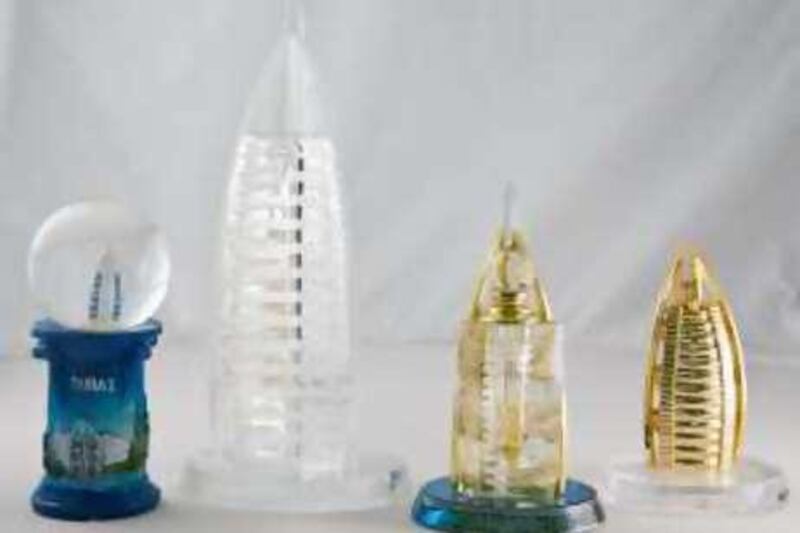DUBAI// It is to Dubai what the Eiffel Tower is to Paris and the Empire State Building to New York City: an instantly recognisable symbol that represents a city and its people. And just like its grand architectural counterparts around the world, the Burj Al Arab has become a favourite of makers of cheap, unlicensed souvenirs which flout copyright laws and produce a dizzying variety of products such as plastic models, perfume bottles, snow globes and refrigerator magnets.
It is also, say some copyright advocates, a prime example of how some companies take advantage of a lack of intellectual property law enforcement to exploit some of the country's highest-value brands and images. While statuettes that retail for less than US$2 (Dh7) do not seem like much of a threat to anybody, the advocates say the issue will become more important as the UAE adopts a knowledge-based economy.
Like many other landmark Dubai buildings, the Burj Al Arab's design is copyrighted by its owner, Jumeirah. Under the country's strict laws, it is illegal even to photograph the building. The reality in gift shops across the city, where rows of unlicensed Burj Al Arab memorabilia manufactured in China and Thailand are displayed, is starkly different, however. At one shop, Huda Gifts in Deira, managers said they were helping Jumeirah promote its brand.
"We have local customers in the UAE and foreign firms in Iran, India and African countries who buy from us here in Dubai," said Amin Maliki, one of the shop's managers. "There are many companies making Burj Al Arab items. They are unlicensed products but I don't think Jumeirah will try to stop them. It is good for Jumeirah." Lawyers say such companies need to be reined in. "Some countries have a copyright exception for photography, others such as the UAE do not," said Rob Deans, head of intellectual property (IP) at Clyde and Co.
"It would be counterproductive if Jumeirah pursued a man who takes a photo of his wife in front of the Burj Al Arab. But if people are making money out of the Burj Al Arab and it's not licensed then they may feel differently." In a statement, Jumeirah said it was doing its best to protect the Burj Al Arab brand while acknowledging that the building is a symbol of Dubai. "We are very pleased to know that Burj Al Arab is now often presented as the symbol of Dubai in the same way as the Sydney Opera House and the Eiffel Tower," it said, but added that it would "continue to take all necessary actions to protect all intellectual property rights relating to the design of the Burj Al Arab".
Mr Deans said dedicated IP courts should be created to deal with copyright infringements. "We are at the stage now where an oil-based economy is becoming a knowledge-based economy and significant quantities of intellectual property are being created," he said. "Enforcement in areas such as pirated DVDs has been around for a long time but we are now seeing more infringements on locally generated intellectual property.
"There are huge numbers of valuable brands that did not exist five years ago. Jumeirah, Emirates and Etihad are not just UAE names anymore, they are brands with serious value. Here, IP is being created. The next step is to create and define rights and establish ownership of that intellectual property. Mr Deans said the UAE's drive to create original products, such as TV and internet content via companies located in media free zones such as Dubai's Media City or Abu Dhabi's planned twofour54 enterprise, as well as scientific breakthroughs at science parks, meant it would need to defend products with "serious long-term value" that could contribute to the region's long-term prosperity."
"If you look at an Asian tiger economy such as Thailand, you will find perhaps a couple of local brands of cigarettes but overall they are economies where IP from western countries is being exploited," he said. "That's not the case in the creative triangle of Abu Dhabi, Dubai and Doha in Qatar. "The UAE has the foresight to want to create and the capital to make it happen. All this will have serious long-term value."
Both the police and municipalities have the power to seize counterfeit goods, Mr Deans said, while copyright plaintiffs can seek redress through the courts. Companies that pay hefty licencing fees to Jumeirah to sell models of the Burj Al Arab might not profit much. "We are spending money on the licence fees to sell these goods but we are not selling many and we don't make much money on them," said an employee at Al Jaber Gallery, which sells official replicas in several malls. The employee spoke on the condition of anonymity. tspender@thenational.ae






